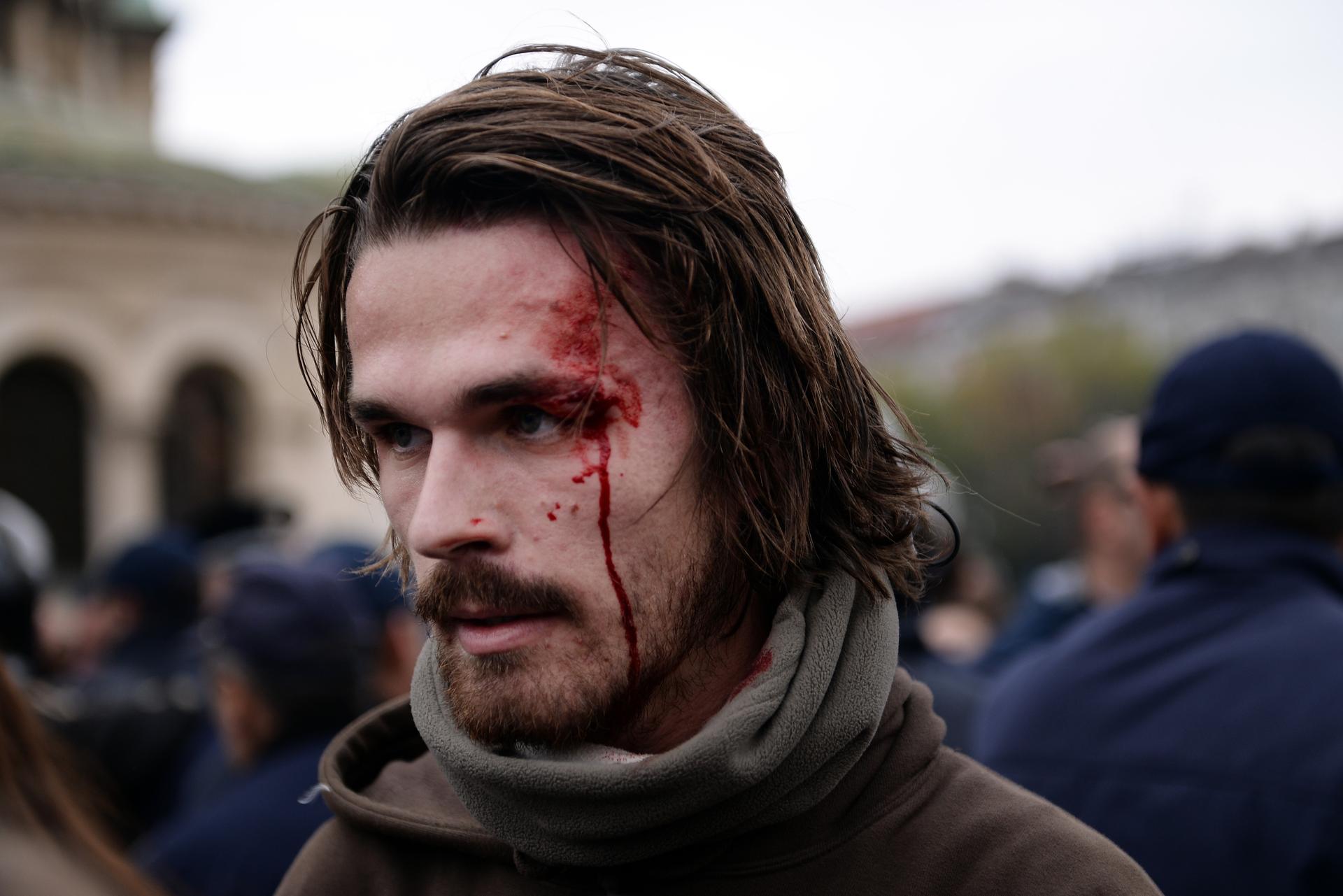It’s getting ugly in Sofia: Bulgarian students barricade university
A protestor in front of parliament on Tuesday
SOFIA, Bulgaria — Judging by the ferocity of the bear hug a middle-aged cleaning lady gives Ivaylo Dinev, she isn’t troubled by the extra work created by the hundreds of students living, eating and sleeping in Sofia University’s lecture halls for the past three weeks.
“They are great, these students, they should work for us,” she says, arms locked around the 24-year-old anthropology student. “This parliament should go!”
Dinev and his fellow students are at the epicenter of a five-month protest movement against the corruption and nepotism that many Bulgarians say has plagued every administration since the fall of communism in 1989.
On Tuesday, some of them clashed with riot police in front of the parliament building, which they had tried to barricade while calling for the country’s legislators to resign.
Their actions are clearly popular. Thousands of people sharing their views poured onto the capital’s streets on Sunday, waving flags and banners and chanting “Resign!”
Some 60 percent of Bulgarians have expressed support for the student movement, which has since spread to about a dozen universities around the country.
“We want morality in politics and we want our politicians to work for the people, not the Mafia oligarchy, and we want this government to resign,” says Dinev, one of the hundreds of students who decided to take over the university last month.
Behind the institution’s grand façade, they engage in excited chatter about the future they want to build. Each night, they gather in the main lecture hall to debate their game plan. The floors are strewn with paint pots and half-finished banners.
“All the people have hope for the future, and this hope is in the young people, in the students,” Dinev says.
Many academics have also weighed in, releasing a statement criticizing the “lies and 'tycoonization' of the political and social environment.” European Union officials have also voiced sympathy for the protesters.
“It's part of a much wider movement in many countries against corruption and entrenched political elites,” says Professor James Pettifer, teacher of Balkan studies at Oxford University. “The problem in Bulgaria is there have been the same people for two generations… [there is] a particularly entrenched narrow elite and it was able to survive almost unchanged since the end of communism.”
While other “Occupy” movements rallying against power in the hands of an elite few have withered away, however, the protests in Bulgaria have endured. A first wave earlier this year against a hike in utility prices prompted early elections, which brought the current Socialist government to power in May.
Demonstrations flared again in June, when the government nominated a controversial media mogul to head the National Security Agency. A public outcry led to a swift U-turn by the government, but it was too late: a new round of protests had begun, with varying numbers of people having taken to the streets every night for the past 152 days.
Protesters say they want to break the nexus between political, business and media elites the tycoon’s appointment typified.
Tihomir Bezlov, a senior analyst at Sofia's Center for the Study of Democracy, says it’s rooted in the relatively short histories of the country’s political parties.
“They’re very weak and very dependent on financing from these oligarchs,” he says. “You have the same problem in a lot of Eastern European nations.”
In the EU, only Greece fares worse on Transparency International’s corruption perception index.
According to the US State Department's annual human rights report, “officials in all branches of government often engaged in corrupt practices with impunity,” with perpetrators rarely prosecuted.
With most of Bulgaria’s newspapers and TV stations in the business elite’s hands, it is “routine practice for owners to dictate the media’s editorial content and political slant,” the report says.
There’s also a strong feeling that the promises made after the fall of Communism have failed to materialize.
In the European Union’s poorest member, prosperity has come only to a select few.
Accession to the bloc in 2007 also led to a feeling of disappointment, after the global financial crisis hit Bulgaria hard the following year. Nearly a quarter of young people remain out of work.
It’s not clear how the protests will end. Prime Minister Plamen Oresharski has resisted calls to step down and has criticized the students for blocking access to education. Analysts predict he will struggle to see out a full term, but he may be able to weather the current protests as long as their numbers remain in low thousands.
More from GlobalPost: Washington asks Albania to help destroy Syrian chemical weapons
Back behind Sofia University’s walls, the rallying cries show no signs of diminishing. Students are stockpiling food, bedding and other goods that supporters bring to the security checkpoints every day.
After Sunday's protest — which marked 24 years since the ouster of the Communist dictator Todor Zhivkov — they chained the gates shut.
“If they try to remove us by force, then the whole of Bulgaria will rise — it will the biggest gift they could give us,” says socialism student Petar Petrov, 23.
He’s ready for the long haul and confident of a victory. “Every time there’s a student revolt, it brings about change, so they [the government] are scared.”
The article you just read is free because dedicated readers and listeners like you chose to support our nonprofit newsroom. Our team works tirelessly to ensure you hear the latest in international, human-centered reporting every weekday. But our work would not be possible without you. We need your help.
Make a gift today to help us reach our $25,000 goal and keep The World going strong. Every gift will get us one step closer.
